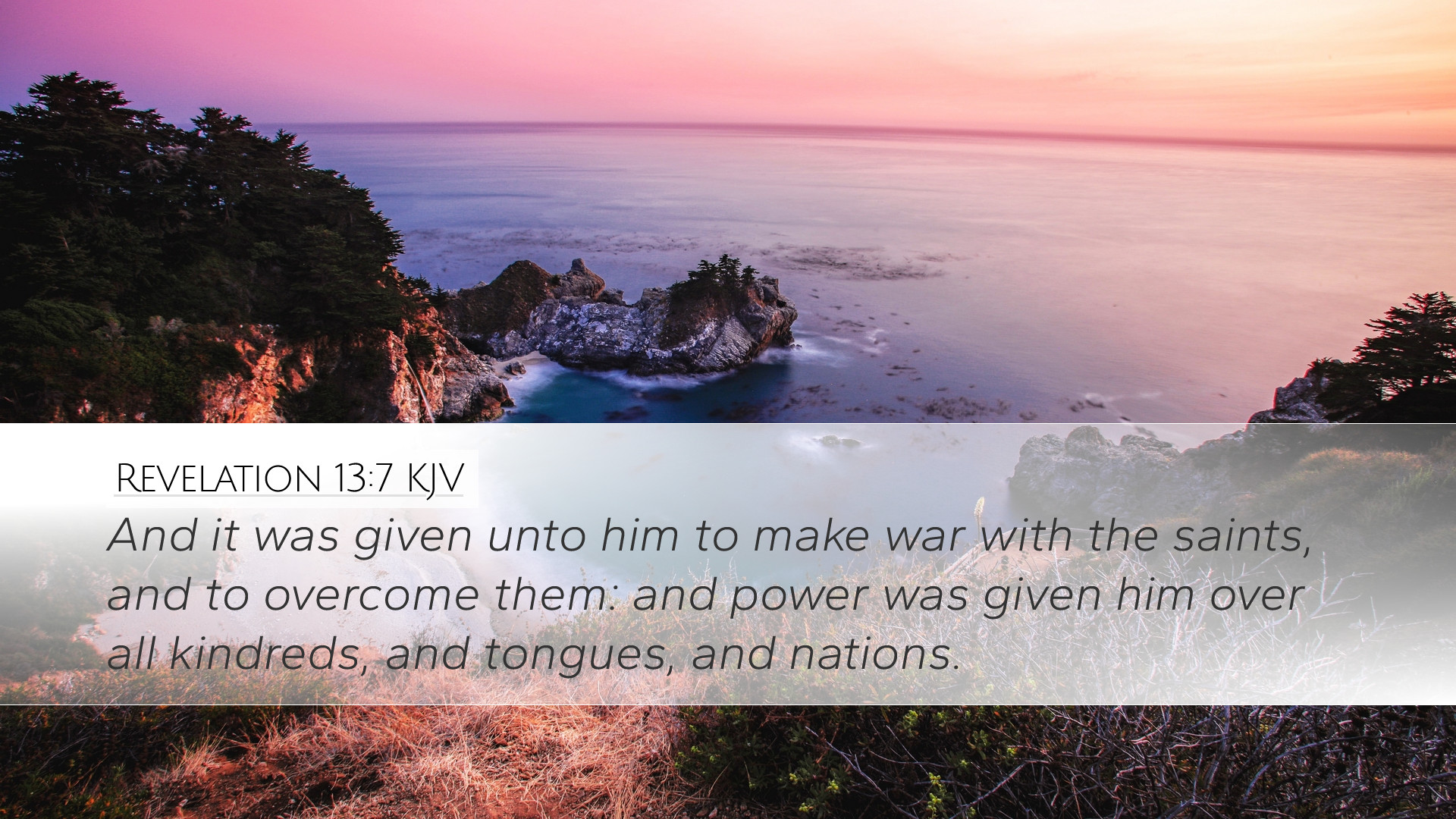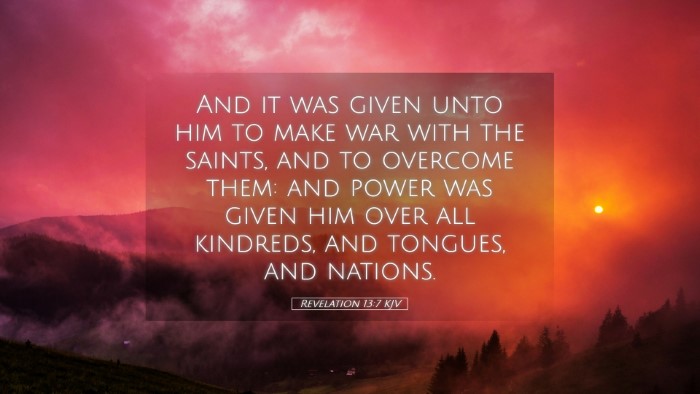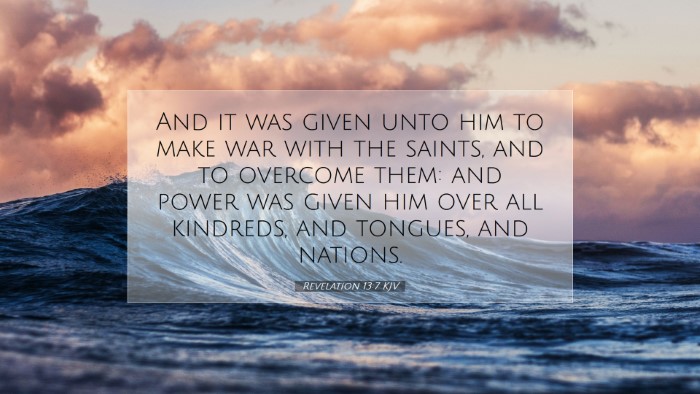Commentary on Revelation 13:7
Revelation 13:7 states: "And it was granted unto him to make war with the saints, and to overcome them: and power was given him over all kindreds, and tongues, and nations."
Introduction
This verse is situated within the context of the apocalyptic vision given to John, where the rise of a formidable power, often interpreted as the Antichrist or a symbol of persecution, is detailed. Commentaries by classic theologians such as Matthew Henry, Albert Barnes, and Adam Clarke provide profound insights into the implications of this verse.
Historical Context and Theological Implications
This scripture reflects the struggle of the early Church against systemic oppression and ultimate persecution. Each commentator brings a vital perspective on the implications of this passage for understanding power dynamics in the spiritual realm.
Matthew Henry's Insights
Matthew Henry emphasizes the sovereignty of God even amidst persecution. He points out:
- Divine Permission: The phrase "it was granted unto him" underscores that any authority wielded by the beast (often interpreted to symbolize secular or religious powers opposed to God's kingdom) is permitted by God for His ultimate purpose.
- Conflict with the Saints: Henry cites the inevitability of conflict between the saints and anti-Christian forces, hinting that this moment of suffering serves a larger divine narrative of redemption and vindication.
- The Role of Suffering: He notes that the trials faced by the saints are paradoxically a testament to their faith, suggesting that through these tribulations, their faith and character are refined and made manifest.
Albert Barnes' Contributions
Albert Barnes presents a more systematic exposition of the power of the beast:
- Universal Authority: Barnes interprets the "power" granted to the beast as indicative of a universal jurisdiction, pointing to the pervasive influence such powers can exert across nations and cultures.
- Persecuting Authority: He discusses the implications of a regime that not only wishes to defeat the saints but triumphs over them, suggesting the chilling reality of apostasy when the church is weakened by persecution.
- Plea for Endurance: Barnes encourages believers to maintain faith, reassuring them that those who endure will eventually witness God's justice manifest against the oppressive forces.
Adam Clarke's Analysis
Adam Clarke approaches the text through a detailed exegetical lens, discerning the ramifications of "making war" with the saints:
- Symbolism of War: Clarke interprets the "war" not merely as physical combat but as a symbol of spiritual conflict. The beast represents false religion and government that undermine the true faith.
- The Saints’ Resilience: He highlights that despite the apparent victory of evil, the inherent strength and resilience of the faithful are significant themes throughout scripture, reaffirming that the ultimate victory belongs to God.
- Societal Impact: Clarke notes that the power over "kindreds, tongues, and nations" suggests a profound societal impact, indicating how collective movements can sway individuals away from truth in times of moral and spiritual decay.
Exegesis of Key Terms
In examining the critical terms within the verse, we can expound on various elements that enrich our understanding:
- "Granted": This denotes divine allowance, affirming God's ultimate control over all worldly authorities, even those that seem to contradict His will.
- "Make war": The verb connotes a sustained and systematic attempt to undermine the faith of believers, illustrating the brutality of spiritual warfare.
- "Overcome": The use of this term indicates not merely a defeat but a comprehensive triumph that the beast achieves over Christians, reflecting the real struggles of the early church.
- "Power": Signifying authority bestowed for specific purposes, reflecting God's sovereignty in enabling the beast’s actions for eventual divine purposes.
Theological Reflections
The theological reflections on Revelation 13:7 compel us to consider several profound questions regarding the nature of God’s justice, the role of believers in times of trial, and the implications of earthly powers:
- The Sovereignty of God: How does God's sovereignty manifest in the granting of authority to entities opposed to Him?
- The Nature of Suffering: What is the purpose of suffering in the life of a believer, and how does it align with God’s greater plan?
- Faithfulness Amidst Trials: What does faithfulness look like in the face of persecution, and how can believers prepare for such times?
Conclusion
In summary, Revelation 13:7 serves as a poignant reminder of the realities of spiritual conflict and persecution faced by the Church throughout history. Through the insights of esteemed public domain commentaries, we understand that the struggle between good and evil is not only a theme in the Revelation narrative but one that resonates deeply in theological discussions to this very day. The verse encourages faithfulness, resilience, and assurance in God’s ultimate victory, serving as a call to spiritual preparedness among believers, pastors, and scholars alike.


